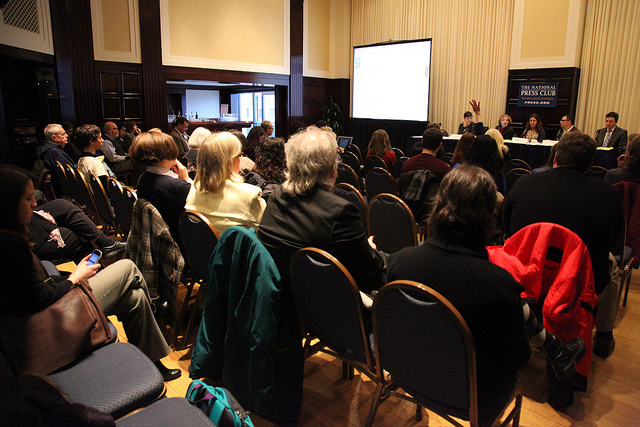
A media conspiracy that’s good for you
A panel during Sunshine Week 2014 at the National Press Club. Photo by Sunlight Foundation on Flickr.
Cross-posted with permission from the American Society of News Editors.
Each spring for 10 years now, a vast media conspiracy has rolled across the hills and plains of this nation. Journalists of every stripe – cartoonists to commentators to hard news reporters – have been in on it. And not just journalists, but politicians, educators and librarians, as well as members of nonprofits and civic groups.
What’s the conspiracy? It’s called Sunshine Week, and it is built around the birthday of James Madison, the father of the Bill of Rights. This year, the week is March 15-21.
The agenda: to brazenly promote your right to know. Open government, we argue, only works when public information flows freely. As Madison himself explained nearly two centuries ago: “Knowledge will forever govern ignorance; and a people who mean to be their own governors must arm themselves with the power which knowledge gives.”
Grants from the John S. and James L. Knight Foundation, where I work, launched and have helped sustain Sunshine Week. At the start, in a speech to roughly 100 open government advocates, I said the foundation could support them only if they could find a way to work together. They did.
After a decade, can we say that Sunshine Week is working? Yes. And no.
Search Google and you’ll see hits tripling over the years. That’s the work of the American Society of News Editors. Millions of people read stories about open government. New openness laws pass. Cities, states and the feds issue proclamations. This year’s California bill officially recognizes Sunshine Week as “a celebration of the public’s commitment to openness and an exploration of what open government means in a technology-enhanced future.”
Experts like Rick Blum of the Sunshine in Government Initiative testify about how freedom of information saves lives, of how it tells us, for example, when our Marines have been issued body armor with life-threatening flaws. Today, says Steven Aftergood of the Federation of American Scientists, we have more access than ever to official information about topics like intelligence spending and the size of the U.S. nuclear arsenal. Overall, access seem much better than in the day after the 9/11 attacks, when public documents vanished from websites like so many fireflies blinking out.
Unfortunately, examples also abound of closed government, of public information held hostage. This week, major news organizations are reporting that too many government agencies are trying to block the public’s access to its own information by charging exorbitant fees. Or turning our information over to businesses that are not transparent. Or muddying up freedom with restrictions that display an ignorance of what freedom really means.
Secrecy is a bipartisan proposition. Hillary Clinton’s hidden emails? George W. Bush did the same kind of thing. All over Washington, documents are stamped “classified” for no good reason. Governments big and small are affected. Virginia, by not paying attention to just one of its own data files (according to Waldo Jaquith of U.S. Open Data) was leaving millions of dollars in revenue uncollected. In Maryland, Fredrick County Councilman Kirby Delauter went so far as to threaten to sue if his name was printed in the newspaper.
So the battle continues. Always there have been those who would hide the truth and seek personal advantage in the darkness. We can’t stop fighting for sunshine because they won’t stop fighting against it.
In the end, the American experiment will fail unless the people who run this country -– us -– know nearly as much as the people who work for us — our employees, the government.
But is sunshine by itself enough? Madison said, we must “arm ourselves with knowledge.” We can’t just know that our government disregards its own Freedom of Information laws. We have to do something about it.
This year, during Sunshine Week, consider joining us at sunshine events in your community or online. Yours are the laws being broken. Yours is the information being stolen. Yours are the truths being bludgeoned. In the long run, your participation is the only thing that really matters. If you see public information go into hiding, complain, complain, complain.
It’s your right.
Eric Newton is senior adviser to the president of the John S. and James L. Knight Foundation in Miami, Fla.
Recent Content
-
Journalismarticle ·
-
Journalismarticle ·
-
Journalismarticle ·


